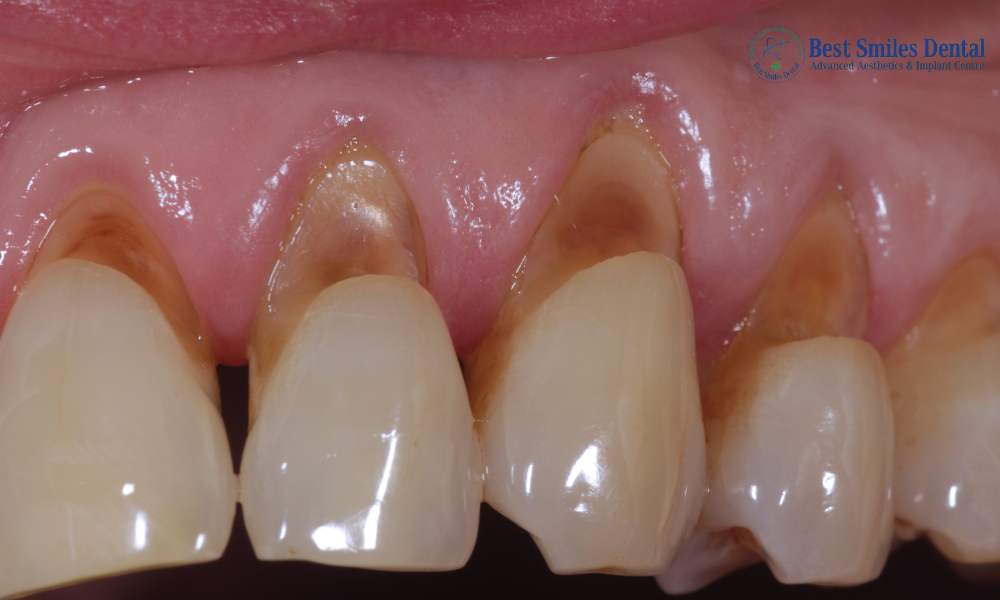Treatment for Worn-Out Teeth (Attrition and Abrasion)
Treatment for Worn-Out Teeth (Attrition and Abrasion)
Need Appointment ?
What causes teeth to wear out (attrition and abrasion)?
Teeth wear out due to:
- Attrition: Natural tooth-to-tooth contact caused by grinding or clenching (bruxism).
- Abrasion: External factors like aggressive brushing, use of hard-bristled toothbrushes, or habits like chewing on hard objects.
Other contributing factors include acidic diets, aging, and certain medical conditions like GERD or bulimia.
Book Appointment to find out which treatment might be best for you at Best Smiles Advanced Dental Clinic.

What are the symptoms of worn-out teeth?
Common symptoms include:
- Flattened or chipped teeth.
- Increased tooth sensitivity to hot, cold, or sweet foods.
- Changes in bite or jaw discomfort.
- Yellowish teeth due to exposed dentin.
- Thinning or sharp edges on teeth.
What are the treatments for worn-out teeth?
Treatment depends on the severity of the wear:
- Dental Bonding: Applying tooth-colored resin to repair small chips or worn areas.
- Veneers: Porcelain shells placed over the front surface of teeth for cosmetic and protective purposes.
- Crowns: Used for severely worn teeth to restore structure and strength.
- Night Guards: Custom-made appliances to prevent teeth grinding during sleep.
- Orthodontic Treatment: Correcting bite misalignments that cause excessive wear.
- Fluoride Treatments: Strengthening enamel and reducing sensitivity.
- Lifestyle Modifications: Avoiding acidic foods, using soft-bristled toothbrushes, and addressing bruxism.
How can I prevent further tooth wear?
To prevent attrition and abrasion:
- Wear a custom night guard if you grind your teeth.
- Avoid aggressive brushing and use a soft-bristled toothbrush.
- Limit acidic foods and beverages like citrus, soda, and wine.
- Practice good oral hygiene to maintain enamel health.
- Treat underlying conditions like GERD or bruxism.
What are the risks of untreated worn teeth?
If left untreated, worn teeth can lead to:
- Increased tooth sensitivity.
- Difficulty chewing or speaking.
- Changes in bite alignment, causing jaw pain or TMJ disorders.
- Risk of fractures or further tooth damage.
- Higher likelihood of cavities and gum issues.

Pain-Free Dentistry
Comfortable, stress-free treatments every time.

Next-Gen Equipments
Precision care with advanced technology.

Expert Care Guaranteed
Trusted specialists for superior oral health.
Frequently Asked Questions
Discover everything you need to know about professional tooth cleaning and polishing. Learn how it removes plaque, enhances your smile, and promotes better oral health.
Tooth wear is not reversible because enamel cannot regenerate. However, dental treatments like bonding, veneers, or crowns can restore the appearance and function of worn teeth. Preventive measures can also stop further damage.
Bruxism, or teeth grinding, exerts excessive pressure on teeth, leading to attrition. Over time, this habit can cause significant enamel loss, sensitivity, and changes in the bite. A dentist can recommend a custom night guard to protect teeth from grinding damage.
Yes, acidic foods and beverages can erode enamel and contribute to tooth wear. It's essential to limit acidic items and rinse your mouth with water after consuming them. Chewing sugar-free gum can also help neutralize acids.
You should consult a dentist if:
- You notice visible changes in tooth shape or size.
- You experience sensitivity, pain, or difficulty chewing.
- Your teeth feel rough, sharp, or uneven.
- You suspect you grind your teeth at night
The cost depends on the treatment type:
- Dental Bonding: ₹1,500–₹4,000 per tooth.
- Veneers: ₹8,000–₹25,000 per tooth.
- Crowns: ₹5,000–₹15,000 per tooth.
- Night Guards: ₹2,000–₹10,000.
Consult your dentist for a tailored treatment plan and cost estimate.
Yes, worn teeth can lead to jaw pain, headaches, and digestive issues if chewing becomes difficult. Treating worn teeth not only improves oral health but also enhances overall well-being.

